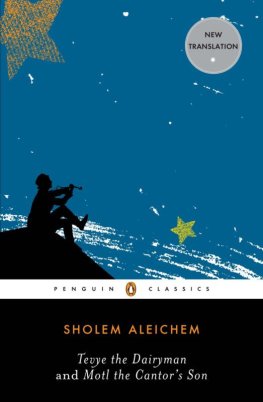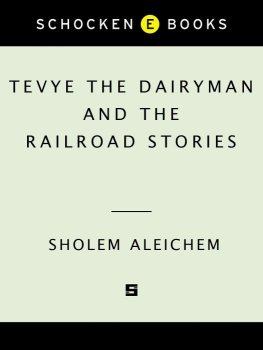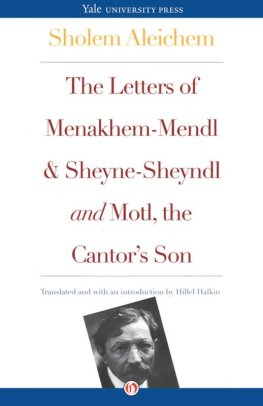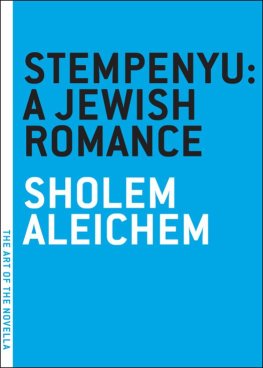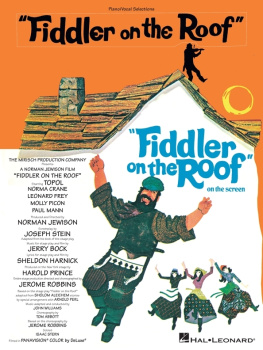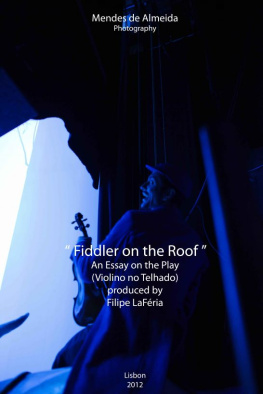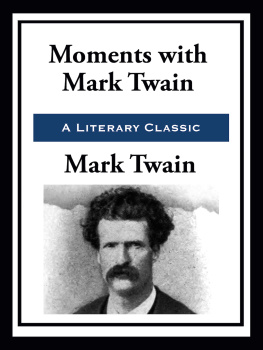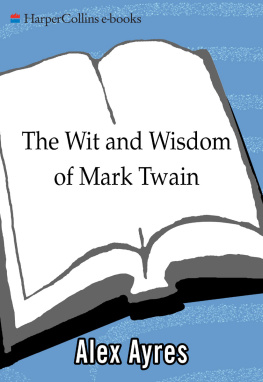Sholem Aleichem - Tevye the Dairyman and Motl the Cantor's Son
Here you can read online Sholem Aleichem - Tevye the Dairyman and Motl the Cantor's Son full text of the book (entire story) in english for free. Download pdf and epub, get meaning, cover and reviews about this ebook. year: 2009, publisher: Penguin, genre: Prose. Description of the work, (preface) as well as reviews are available. Best literature library LitArk.com created for fans of good reading and offers a wide selection of genres:
Romance novel
Science fiction
Adventure
Detective
Science
History
Home and family
Prose
Art
Politics
Computer
Non-fiction
Religion
Business
Children
Humor
Choose a favorite category and find really read worthwhile books. Enjoy immersion in the world of imagination, feel the emotions of the characters or learn something new for yourself, make an fascinating discovery.
- Book:Tevye the Dairyman and Motl the Cantor's Son
- Author:
- Publisher:Penguin
- Genre:
- Year:2009
- ISBN:978-1-101-02214-6
- Rating:5 / 5
- Favourites:Add to favourites
- Your mark:
- 100
- 1
- 2
- 3
- 4
- 5
Tevye the Dairyman and Motl the Cantor's Son: summary, description and annotation
We offer to read an annotation, description, summary or preface (depends on what the author of the book "Tevye the Dairyman and Motl the Cantor's Son" wrote himself). If you haven't found the necessary information about the book — write in the comments, we will try to find it.
Tevye the Dairyman and Motl the Cantor's Son — read online for free the complete book (whole text) full work
Below is the text of the book, divided by pages. System saving the place of the last page read, allows you to conveniently read the book "Tevye the Dairyman and Motl the Cantor's Son" online for free, without having to search again every time where you left off. Put a bookmark, and you can go to the page where you finished reading at any time.
Font size:
Interval:
Bookmark:

Tevye the Dairyman
and
Motl the CantorS Son
by
Sholem Aleichem
For my family, with love:
Howie
our four children and their spouses
our seven grandchildrenAbout Authors
SHOLEM ALEICHEM is the pen name of Sholem Rabinovitch (18591916), the most beloved writer in Yiddish literature and the creator of the famous Tevye character in the musical Fiddler on the Roof. His hundreds of short stories, plays, novels, poems, and feuilletons are still read, studied, produced, and translated all over the world.
Born in a small town in Ukraine, he began writing in Hebrew at an early age and first supported himself as a teacher of Russian. He also worked as a government rabbi, a clerk, and a businessman-speculator. He married the daughter of a wealthy landowner, upon whose death he became the administrator of her familys large estate in Kiev. He turned to writing Yiddish fiction in 1883 and encouraged a number of Jewish writers, who were writing in Hebrew, to write in Yiddish as well, offering to publish their work as an incentive.
After the 1905 pogrom in Kiev, Sholem Aleichem and his large family left Russia, seeking refuge in Italy, Denmark, Switzerland, and America. He returned to Europe a year later, making personal appearances to great acclaim, but in 1914, at the start of World War I, he settled in New York, where his wit and writings caused some to call him the Jewish Mark Twain. He died two years later after a long illness, writing until his last day. His funeral procession was witnessed by one hundred thousand mourners.
ALIZA SHEVRIN is the foremost translator of Sholem Aleichem, having translated eight other volumes of his fiction as well as novels and stories by Isaac Bashevis Singer and I. L. Peretz. The daughter of a rabbi, she grew up in a Yiddish-speaking household in Brooklyn and attended Farband Yiddish schools until the age of fifteen. She holds a bachelors degree in agriculture from Cornell University and a masters degree in social work from the University of Kansas. The recipient of a Rockefeller Foundation Fellowship to preserve Yiddish works by rendering them into English, she has also been a visiting scholar at the Rockefeller-Bellagio Study Center in Italy, where she translated Sholem Aleichems novel In the Storm. She lives with her husband in Ann Arbor, Michigan.
DAN MIRON is William Kay Professor of Hebrew and Comparative Literature at Columbia University and Professor of Hebrew Literature at the Hebrew University of Jerusalem. He is the author of A Traveler Disguised
Introduction
SHOLEM ALEICHEM
Sholem Rabinovitch (18591916), born in the Ukrainian regional center of Peryeslav but raised throughout his childhood in the tiny village of Voronkov (where he was steeped in the ambience of the eastern European Jewish hamlet, the shtetl), first received a traditional Jewish cheder (primary school) education. Then, the family having moved back to Peryeslav, he attended a Russian high school his fathers partial exposure to modernity (as a follower of the Hebrew Enlightenment) made this possible. Thus he amassed Jewish booklore, was fully proficient as a Hebraist, and was inspired by modern Russian literature and liberal ideals. A scion of the old-style Jewish middle class (the familys business was the cutting and shipping of timber) which, under the circumstances of the relatively advanced capitalism in Russia of the late nineteenth century, came down in the world he was motivated since childhood by two dreams: to become fabulously rich and to become a famous Jewish writer who would elevate Jewish literature to the level of its Russian counterpart. The former dream sent him to the stock exchanges of Kiev and Odessa, where he squandered the considerable wealth of his in-laws, the Loyev family. (That fiasco engendered his first literary masterpiece, an epistolary story based on the correspondence of the misguided speculator and broker Menachem-Mendl and his wife Sheyne-Sheynd, which he started in 1892.) The second dream he managed, to a considerable extent, to realize.
Initially Rabinovitch intended to become either a Russian or a Hebrew writer. (He would try both options with scant success.) But in 1883 he bumped, as if by accident, into Yiddish, the spoken language of eastern European Jews, and soon became obsessed with the meshugas, the dizzying idiomatic energy of that language as a writing tool. No one else was to tap the immense resources of Yiddish as he did, while endowing his entire corpus, no matter how varying and uneven the artistic level of its many hundreds of units (the twenty-eight volumes of his official collected edition barely cover half of his output), with unparalleled linguistic lan and unflagging rhythmic drive.
In the 1880s the use of Yiddish did not bestow upon a writer literary status, so the young author, driven by high ambitions, decided to gentrify and elevate it forthwith as the language of a respectable European literature. He proceeded to publish thick and very selective literary almanacs in the contemporary Russian format; launched a critical campaign against Yiddish Schund (trash) and for realism in Yiddish writing; and produced a series of realist novels that he dubbed Jewish novels, which tried to synthesize romance (considered an essential ingredient of the novel genre) and realities of the Jewish traditional milieu (where romance was not allowed to play an important role). In the process he managed to establish intimate contact with the then rapidly growing Yiddish reading public through the funny persona Sholem Aleichem (an absurd appellation meaning how dyou do). Comic, folksy personae were rife in Yiddish writing of the time, mediating between the semitraditional, barely educated reading public and modernist, enlightened authors. In this respect and in others Sholem Rabinovitch learned much from the practices of his mentor Sh. Y. Abramovitch and his persona Mendele the Book Peddler. However, Sholem Aleichem, crafted as a whimsical, clever, high-spirited, but quite unruly and unpredictable vagabond, caught the imagination of the readers as did no other persona. People fell in love with his jocular causerie and regarded him as a welcome guest. The success of the persona was such that Rabinovitch could not afford to part with it, and its features merged with the core of his literary-performative identity.
This was one reason that novel writing, in spite of the authors high aspirations, never became his highest level of achievement. As a chatty, omniscient narrator, Sholem Aleichem rarely allowed for a sophisticated novelistic synthesis. Always aware of the limitations of the reading public, he simplified and overexplained his characters and their interactions and insisted on being entertaining even where the narrative hardly justified his intervention. His stories were far more subtle; in them, the characters were allowed to speak for themselves, and Sholem Aleichem was reduced to the role of a silent but omnipresent interlocutor, one whom the characters wished to impress, cajole, or even attack. Informed by this formula, the author created his chief masterpieces, Tevye der milkhiker (Tevye the Dairyman, started in 1894) foremost among them. Here and in a long series of brilliant monologues written between 1900 and 1910, Sholem Aleichem, having regressed from the novelistic synthesis to its primitive rudiments (monologue, letter), achieved the shimmering brilliance of a world-class master.
Following the failed revolution of 1905 and the subsequent pogroms, he decided to leave forever his Ukrainian homeland. He tried and failed to establish himself as a playwright in New York, then began a life of wandering in western and central Europe. In summer 1908 he collapsed with an attack of open pulmonary tuberculosis, which for some years bound him to sanatoria and southern winter resorts. The pace of his literary production, however, did not slacken. Moreover, his writing gained in depth and scope from an exposure to modernistic trends, particularly those of contemporary Russian Silver Age literature. Sholem Aleichem reassessed his views of men, women, and children and felt free to expose undercurrents of egotism, frustrated sexuality, and nihilism in his characters behavior. He also reassessed his earlier liberal and Zionist ideals and concluded that Jewish existence depended on making a shift from an idealistic eastern European culture to the materialism and hedonism he detected in the Jewish immigrant community in the United States.
Next pageFont size:
Interval:
Bookmark:
Similar books «Tevye the Dairyman and Motl the Cantor's Son»
Look at similar books to Tevye the Dairyman and Motl the Cantor's Son. We have selected literature similar in name and meaning in the hope of providing readers with more options to find new, interesting, not yet read works.
Discussion, reviews of the book Tevye the Dairyman and Motl the Cantor's Son and just readers' own opinions. Leave your comments, write what you think about the work, its meaning or the main characters. Specify what exactly you liked and what you didn't like, and why you think so.

